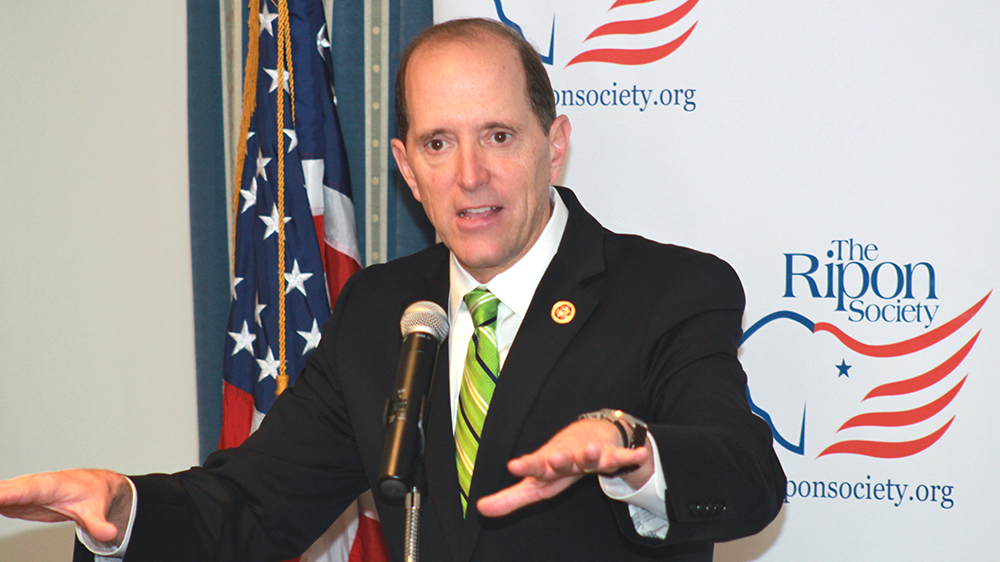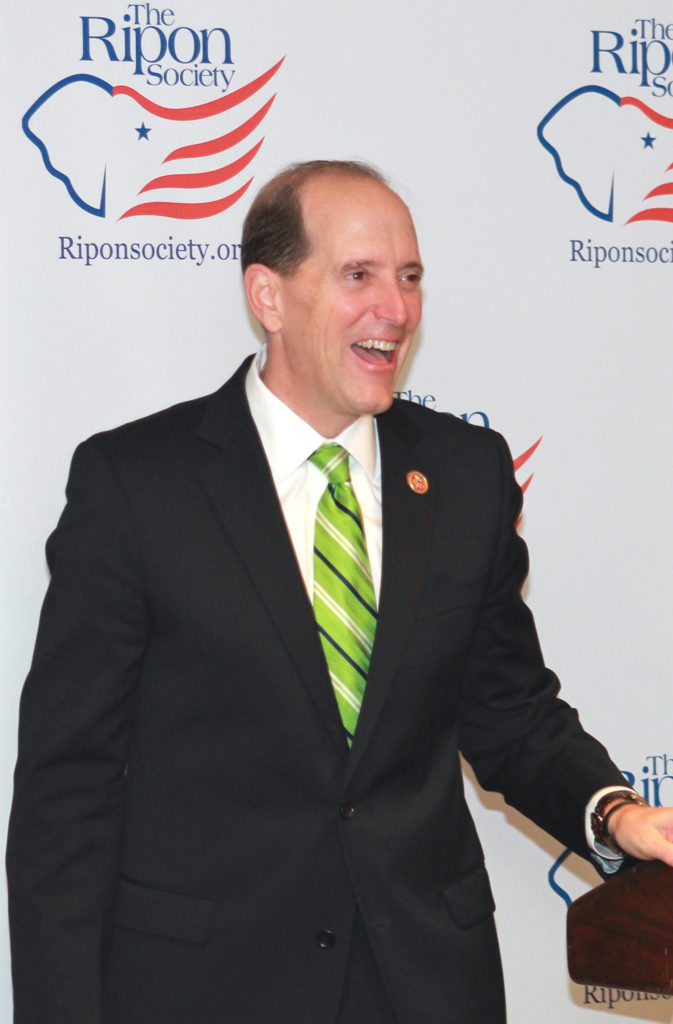“Voters want to see us do something”
 WASHINGTON, DC – Chairman of the Ways and Means Committee Dave Camp (MI-4) spoke to a breakfast meeting of The Ripon Society yesterday morning, discussing, among other topics, the comprehensive tax reform plan he introduced earlier this year and how the GOP’s pro-growth policies during this period of continuing economic uncertainty will help the party in the mid-term elections next month.
WASHINGTON, DC – Chairman of the Ways and Means Committee Dave Camp (MI-4) spoke to a breakfast meeting of The Ripon Society yesterday morning, discussing, among other topics, the comprehensive tax reform plan he introduced earlier this year and how the GOP’s pro-growth policies during this period of continuing economic uncertainty will help the party in the mid-term elections next month.
“We are still facing a fragile economic environment,” the Michigan lawmaker stated. “We had negative growth in the last quarter. The economy retracted. We all know the numbers in terms of youth unemployment and people who have left the workforce — it is at record levels. Even though the unemployment rate is below 6 percent and we can sort of be happy about that, it really is not reflective of what is happening out there. And while, at least until recently, the market seemed to be doing well, it does not really translate when you are at home. It does not mean that when the markets are doing well, families are doing better. Part of the problem is that median incomes are either flat or are declining. So there is a lot of anger out there.”
“Clearly, energy, trade, tax and regulatory policy all can help us,” he stated. “As I travel around, voters — particularly the independents who really decide who are in the majority around here and who wins the White House — want to see us do something. They know it is going to take trade-offs. I will never forget that Alan Simpson called me after we had released the tax bill and said ‘Well, you will never work anywhere again.’ As I go around, people actually know that it was not perfect, but they are so grateful that someone is trying to move the ball forward. I think that is what voters really want to see. What is your vision? What are you going to do? What is your road map for the future?”
The plan, called the “Tax Reform Act of 2014,” set out to become the first overhaul of our tax code since 1986. Among other things, it would: Create up to 1.8 million new private sector jobs; Allow roughly 95 percent of filers to get the lowest possible tax rate by simply claiming the standard deduction; Strengthen the economy and increase the Gross Domestic Product (GDP) by up to $3.4 trillion.
Camp touched on some of the tenets of the 979-page plan and why he believes it provides a framework for lawmakers to follow in the future.
“There are two key things to keep in mind moving forward,” he observed. “One is that people said, ‘You just can’t do it. It is too hard.’ You know, it is hard. But you can do it with a comprehensive bill that actually grows the economy by 20 percent and increases median income by $1,300 a year, increases charitable giving by $2 billion a year, and adds two million more jobs. So there are some significant and positive improvements.”
“Not only did the Joint Committee on Taxation analyze the bill with growth numbers, but several outside independent groups looked at it and said that this will create economic growth. I think that as we move forward, it is going to be economic growth that will really be the touchstone. It is not just in the macro sense, but what does this actually mean for individuals and families? It will mean more benefits and higher wages and it will mean the ability to provide for yourself and your family and really achieve the dreams that you, your kids, and your family may have. That, I think, is really going to be the huge challenge going forward.”
 Camp, who is in his 12th term in office and is retiring at the conclusion of this Congress, was asked to talk about some of the biggest changes that have occurred on the Hill during his time in office.
Camp, who is in his 12th term in office and is retiring at the conclusion of this Congress, was asked to talk about some of the biggest changes that have occurred on the Hill during his time in office.
“The biggest change is the rise of the internet,” he said. “When I was Chief of Staff, I could never leave my desk. You had to answer the phone. Now, you can be anywhere. Secondly, the way the Hill is since 9/11, the security has changed dramatically. When I think of the mid-80s and sort of walking around – it is certainly a different environment. We’re all adjusted to it, but those are two big changes. The third biggest change — which has been recent and with this administration — is that the legislative teams of the President of the United States are no longer all over the Hill. You would see them everywhere and you knew what was happening. There’s such disengagement over the last term, and that is a very big change. I don’t know if that is going to come back or if that is a trend.”
With the recent announcement of such companies as Walgreens and Burger King seeking a corporate tax inversion business model, Camp noted how lowering the tax rate is still the best way to address this growing trend.
“If you try and do something in a stove pipe on inversions, you can be sure it won’t be effective. We did it in 2004 and it clearly hasn’t changed things. Even with what the administration has tried to do on inversions, companies are still moving forward. In the letters that the Secretary of the Treasury has written and in his phone conversations, he admits that the best thing we can do is lower rates. I think it’s a larger package now.”
“There is no reason why we can’t move forward on what Democrats call “business tax reform” which is corporate and individual in the sense of pass-through entities. I think Treasury has done a lot more work than they have admitted. As I said at one forum, I think there is a draft in the drawer over at the Treasury Department. I wish they would pull it out. The real question is does this President want to engage on this issue? I think right now, the inversion issue is a great political issue. We cannot sustain the position we’re in right now.”
“The reason that a stand-alone inversion bill won’t work is because Burger King is creating a third entity. So, anything you do isn’t going to change that. They can keep going forward. But, if we had a lower rate – and this isn’t just me saying this — years of testimony before the Ways and Means Committee, businesses, CEOs, practitioners, saying if you lower the rate, it will obviously takes away the incentive. And, many of them settled on 25 [percent] as the rate that would be the most ideal to take away the advantages of doing that.”
In his closing remarks, Camp noted how Republicans will have to carefully address the Affordable Care Act.
“We’re going to have to get to the problems in the Affordable Care Act because they’re huge. We still don’t know who’s signed up. The guesses we all get is that they are not meeting their targets and premiums are going to be much more expensive. The other shoe that is going to drop is the people who have received subsidies and don’t qualify for them. Their refund is going to be attached and you’re going to have a lot of difficulties, not to mention all of the other structural problems with the Affordable Care Act. I think as a party, we’re going to have to decide what we’re willing to engage to address the problems of the Affordable Care Act. I don’t see a total repeal happening even if we win the Senate because of the 60-vote issue.”
______________________________
The Ripon Society is a public policy organization that was founded in 1962 and takes its name from the town where the Republican Party was born in 1854 – Ripon, Wisconsin. One of the main goals of The Ripon Society is to promote the ideas and principles that have made America great and contributed to the GOP’s success. These ideas include keeping our nation secure, keeping taxes low and having a federal government that is smaller, smarter and more accountable to the people.



